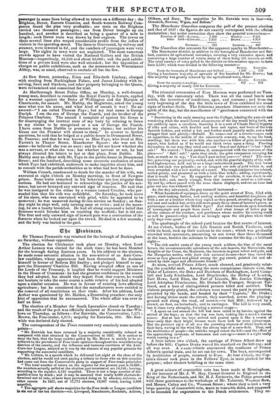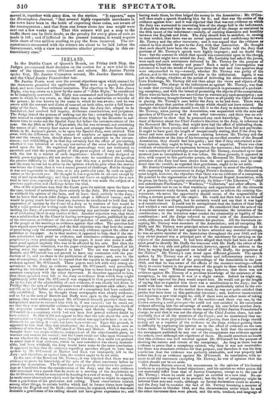Sbe Vrobinces.
Sir Thomas Fremantle was returned for the borough of Buckingham on Saturday, without opposition.
The election for Chichester took place on Monday, when Lord Arthur Lennox was elected for the sixth time ; he has been Member for the borough during fourteen years. In his address to the electors, he made some sarcastic allusion to the non-arrival of an Anti-Corn- law candidate, whose appearance had been threatened. He declared himself in favour of Reform Bill finality ; and pledged himself to sup- port the Dissenters' Charities Bill. Having accepted office as one of the Lords of the Treasury, it implied that he would support Ministers in the House of Commons: he had the greatest confidence in the course they had adopted, but should they depart from that course, he would not hesitate to take the same course a noble relative of his had adopted upon a similar occasion. He was in favour of existing laws affecting agriculture ; but be considered that the manufacturers were entitled to the removal of all restrictions on their trade. After his address, Lord Arthur was questioned by Mr. Malden, a Dissenting preacher ; the only hint of opposition that he encountered. The whole affair was over in half an hour.
The election of a Member for South Lancashire closed on Tuesday ; and the result of the poll was officially declared at Newton-in-the-Wil- lows on Thursday, as follows—For Eutwisle, the Conservative, 7,571 ; Brown, the Free-trader, 6,973; majority for Eutwisle, 598. Mr. Ent- wisle was declared duly elected.
The correspondent of the Times recounts very concisely some notable points- " Mr. Entwisle has been returned by a majority considerably reduced as compared with that obtained by the Conservatives in 1837. It is useless to deny the fact, that the large number polled by Mr. Brown is mainly to be at- tributed to the prevalence of Free-trade opinions throughout the manufacturing districts of the county, and the influence and immense exertions of the Anti- Corn-law League, assisted as it was by the absence of any popular grounds for supporting the successful candidate.
Mr. Cobden, in a speech which he delivered last night at the close of the election, said he would not omit paying a tribute to those who on this occasion bad come out from the Conservative party in support of Free-trade principles. " The total number of voters on the register for the present year is 18,666 ; the numbers actually polled at the election just terminated are 14,546 ; leaving, according to the register, 4,120 unpolled. There is not a large number of dis- qualifications by death; and it may be assumed that nearly 4,000 electors de- termined not to vote, or have been prevented doing so by absence, sickness, or other causes. In 1837, out of 17,775 electors, 13,967 voted, leaving 3,808 unpolled, " The aggregate poll shows majorities for the Free-trade or League candidate in six out of the tea districts—viz. Liverpool, Manchester, Rochdale, Ashton, Oldham, and Bury. The majorities for Mr. Entwisle were iu four—viz. Ormskirk,Newton, Wigan, and Bolton."
The Manchester Guardian compares the poll of the present election and that of 1837: the figures do not exactly correspond with the official declaration ; but under correction they show the general corn parison-
Election of 1837—Euerton 7.82 Stanley 6 576 Ditto 1844—Eutwisle 7,552 Brown 6.97d Decrease 270 Increase 402
The Guardian also accounts for the apparent apathy in Manchester— The Manchester district, in addition to the boroughs of Manchester and Sal- ford, contains 30 agricultural townships, covering a very extensive apace, and containing a large number of voters, many of them being 501. tenants-at-will. The total number of votes polled in the district on this occasion appears to have been 3,550; which were divided in the following manner—
Brown. Eutwisle.
From the boroughs of Manchester and Salford 1,239 ....
Giving a handsome majority of upwards of five hundred for Mr. Brown; but this majority was greatly reduced by the agricultural votes, thus BTOWU . Eutwisle.
From the cottutry townships 627 970 Giving a majority ot nearly 350 for Entwisle.
The triennial ceremonies of Eton Montem were performed on Tues- day, with the customary eclat. There was all the usual bustle and mirth, the inversion of conditions, ages, and costume ; and from the very beginning of the day the little town of Eton exhibited the usual signs of lawless frolic. The following anecdote illustrates not only the spirit of the day, but the munificence of "gentlemen connected with the press"— Sauntering in the early morning near the College, inhaling the pure air and wondering what the much-famed amusements of the day would bring forth, we ran suddenly upon a cavaliero, flaunting it in a sort ot Claude Duval frippery of silks and satins, with doublet and hose and rapier, and boots of the true Spanish fashion, and withal a hat and feather stuck jauntily aside, and a bold swagger that said plainly—Bobadil. To come—out of a reverie—upon such an apparition, in the middle of the nineteenth century, was, to say the least, startling; but there was with him also another—a fellow of grim determined aspect, who looked as if he would not think twice upon a thing. Planting themselves in our way, they cried out—not ' Stand and deliver I '—but ' Salt ! salt ! ' We started : ' Your pardon, if, unacquainted with the customs of this place—' ' Salt ! salt ! ' again they cried; the grim companion stamping his foot, as much as to say, ' You shan't pass unless you—' what ? The cava- lier, perceiving our perplexity, smiled, and, with the graceful dignity of the well- bred highwayman, held out to us a large embroidered pouch. The link 'twist pouch and cash was palpable ; so we dropped our mile of gold within it, and were rewarded with a how worthy of a court. The rough coadjutor too relaxed, smiled grimly, and presented us with a little blue ticket; adding, significantly, that it would ' free ' us. By suggestion of the cavaliero, it was stuck in our button-hole; and, surely enough, from that moment it acted as a tali'man. By and by, others passed with the same charm displayed, and ere an hour had gone not one was without it."
As the day advanced, the gay turmoil increased-
" What hundreds of equipages drove up the quiet street of Eton, filled with grave, staid-looking fathers, and smiling mothers, and beautiful daughters, all with a son or a brother whom they espied as they passed, strutting along in his red coat and cocked-hat, or his still more gaudy fancy-dress of forester's green, or picturesque costume of the Middle Ages ! And what hundreds upon hundreds of townspeople and people from town ! And what troops of ladies gay in all the colours of the rainbow, and gentlemen whose motive for coming could so well be guessed—they looked so lovingly upon the old place where their early days were spent."
The quadrangle of the school-yard became the first centre of interest. At ten o'clock, bodies of the Life Guards and Scotch Fusileers, each with its band, took up their stations in the court ; which was gradually crowded with spectators, amounting to not fewer than three thousand at the least, besides the scholars in their costume for the day ; a brilliant sight- " The rich scarlet coats of the young mock soldiers, the blue of the naval heroes, the uncommunicable splendours of the salt-bearers, the Mareschals, the Knights of the Cross, the Mostemin, the foresters in green velvet and gold, and the Hungarian nobles, with their rich national dresses—how they varied the scene as they glanced and glided among the gay crowd, pointed out aud ad- mired by their eager and affectionate friends! At noon, arrived Prince Albert, much cheered, and graciously salut- ing the youthful mob. Among the more conspicuous visiters w ere, the Duke of Leinster, the Duke and Dutchess of Buckingham, Lord Camp- bell and Lady Siratheden, Lord Bray brooke, the Bishop of London, Earl Howe, Lord Eliot, the Earl of Lincoln, Mr. Justice Coleridge, Lord Adolphus Fitzclarence, Mr. Disraeli the Younger, Sergeant Tat. fourd, and a host of distinguished persons titled and untitled. The visiters properly placed, the scholars went round the yard in procession, preceded by the bands, and headed by their " Captain," Mr. Drake ; and having thrice made the circuit, they marched, across the playing- ground and along the road, ad montem—to Salt Hill ; followed by a crowd, on foot, on horseback, and in carriages. The hill is very small, but it rises very abruptly, forming a natural stage- " A space on and around the bill had been railed in by barrier, agpinst the arrival of the buys ; so that the top was bare, looking like a monk s shaven sconce. But at last the boys arrived and poured upon it like a swarm of bees—only that their bright dresses made them look far more picturesque. But the prettiest sight of all was the crowding clusters of white feathers in their hats, waving in the wind like the silvery tops of a corn-field. That, and the multitudes of people—the vehicles ranged round the hill—and the effect of the approaching cavalcade of horsemen and carriages—made it a sight really worth coming to tke." A little before two o'clock, the carriage of Prince Albert drew up
before the hill; Captain Drake waved his standard on the hill-top ; and all was over. A steam-whistle announced the readiness of Prince
Albert's special train, and he set out for town. The boys, accompanied by multitudes of people, returned to Eton. At four o'clock, the Cap- tain's dinner took place in the Fellows' Eyot, in tents pitched for the purpose ; other dinners befalling at the same time.
A great seizure of counterfeit coin has been made at Birmingham. At the instance of Mr. J. W. May, Consul-General in England to the King of the Netherlands, and Mr. H. J. Ent howin, the Police proceeded with those gentlemen to the workshops of Mr. Taberrer, Weamau Row, and Messrs. Calley and Co , Weawan Street ; where they stized a very large quantity of counterfeit coin, made to resemble doits, and supposed to be intended for exportation to the Dutch settlements. They re-
moved it, together with sixty dies, to the station. "It appears," sap; the Birmingham Journal, "that several highly respectable merchants in the town have been in the habit of exporting these coins, not aware of the consequences ; and that from one house alone two tons weight were sent out a few weeks ago. That this seizure will put a stop to the traffic there can be little doubt, as the penalty for every piece of coin so made is 10/.; and if inflicted in the present instance, it would require little short of two million sterling to pay the fines incurred. The cir- cumstances connected with the seizure are about to be laid before the Government, with a view to determine ulterior proceedings in this ex- traordinary case."



























 Previous page
Previous page